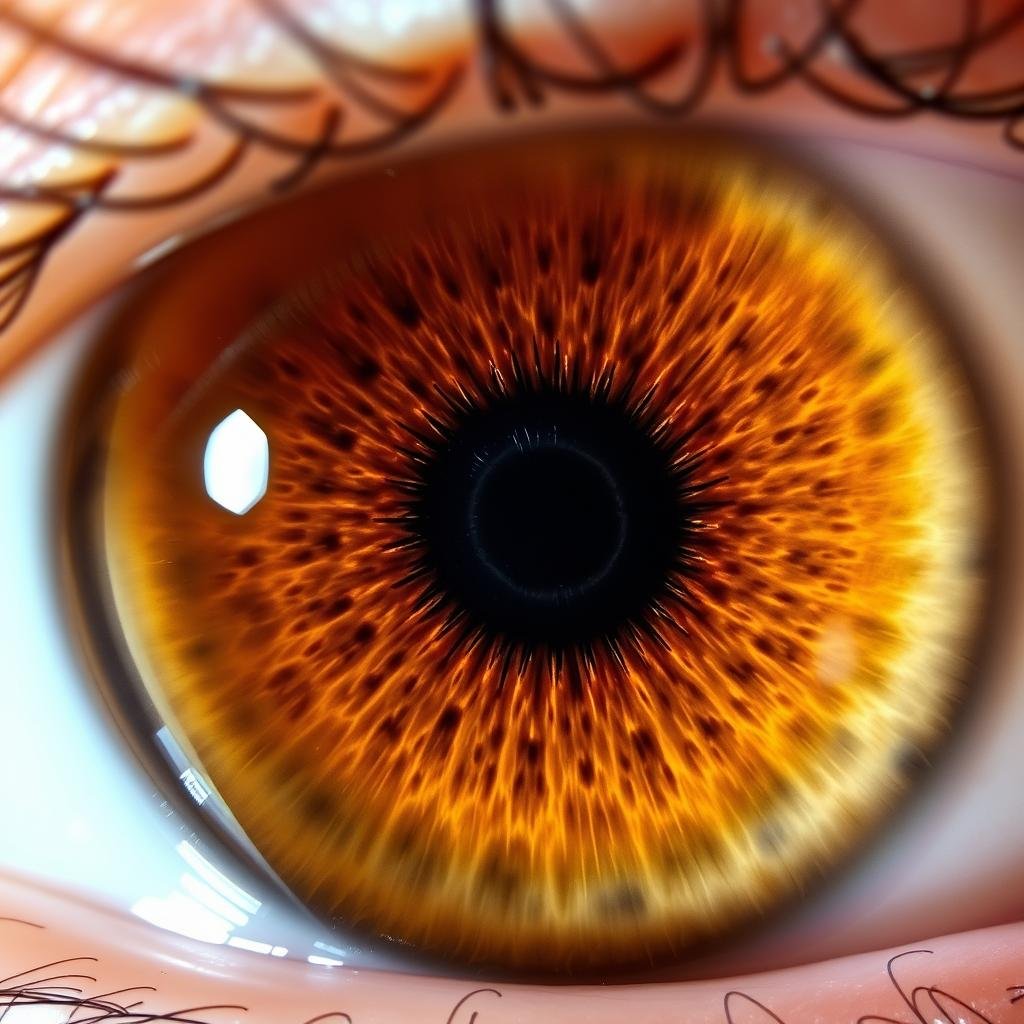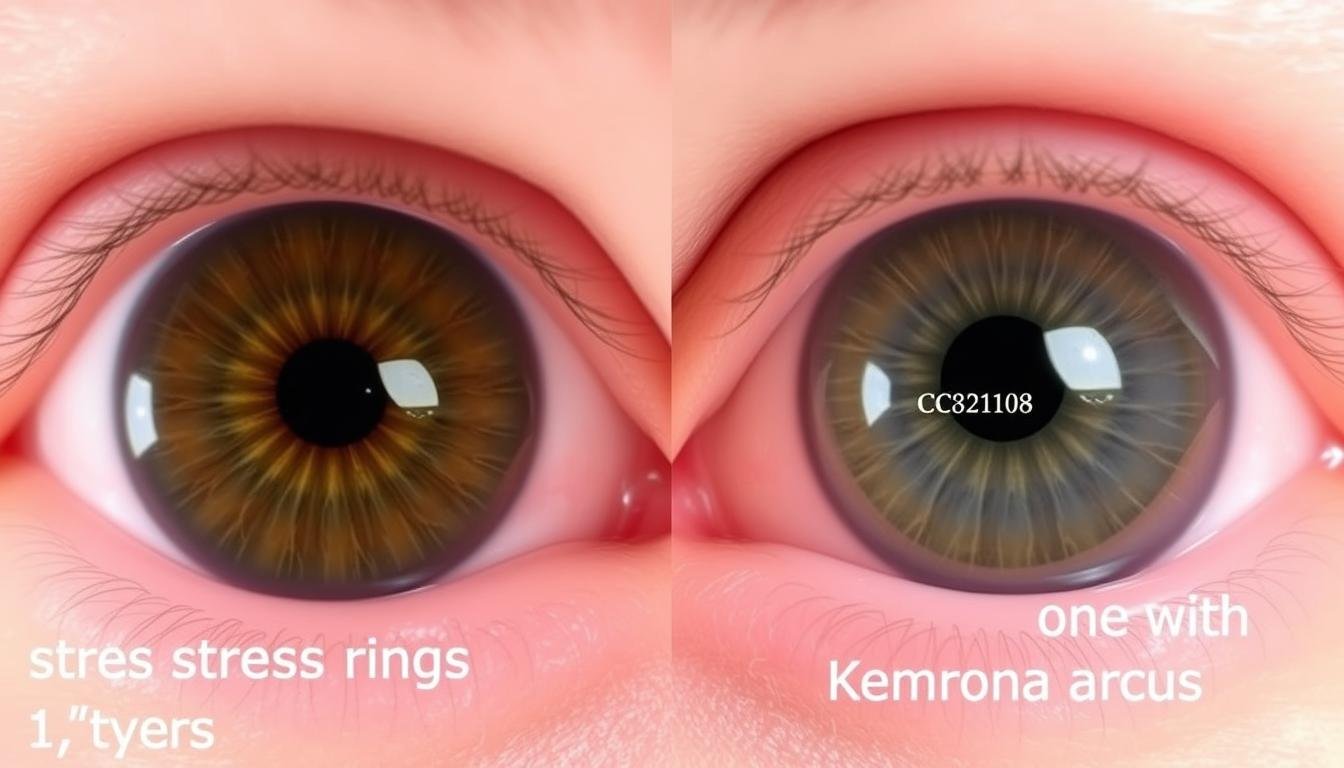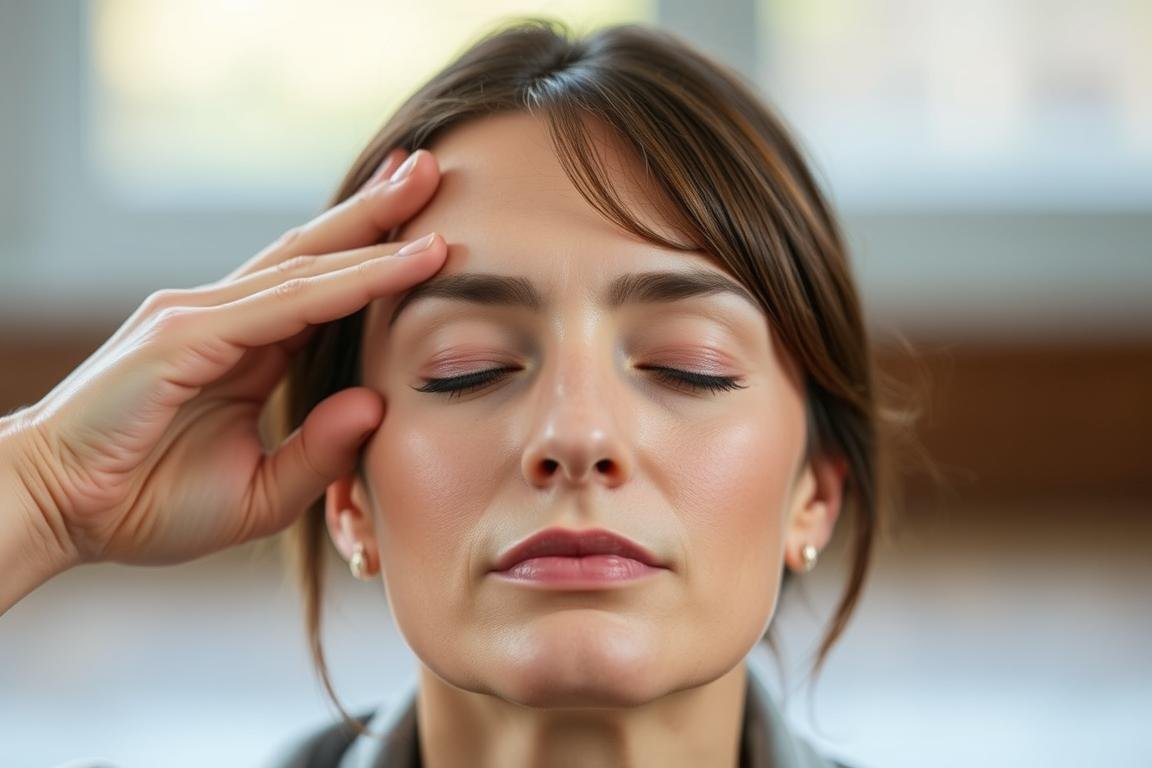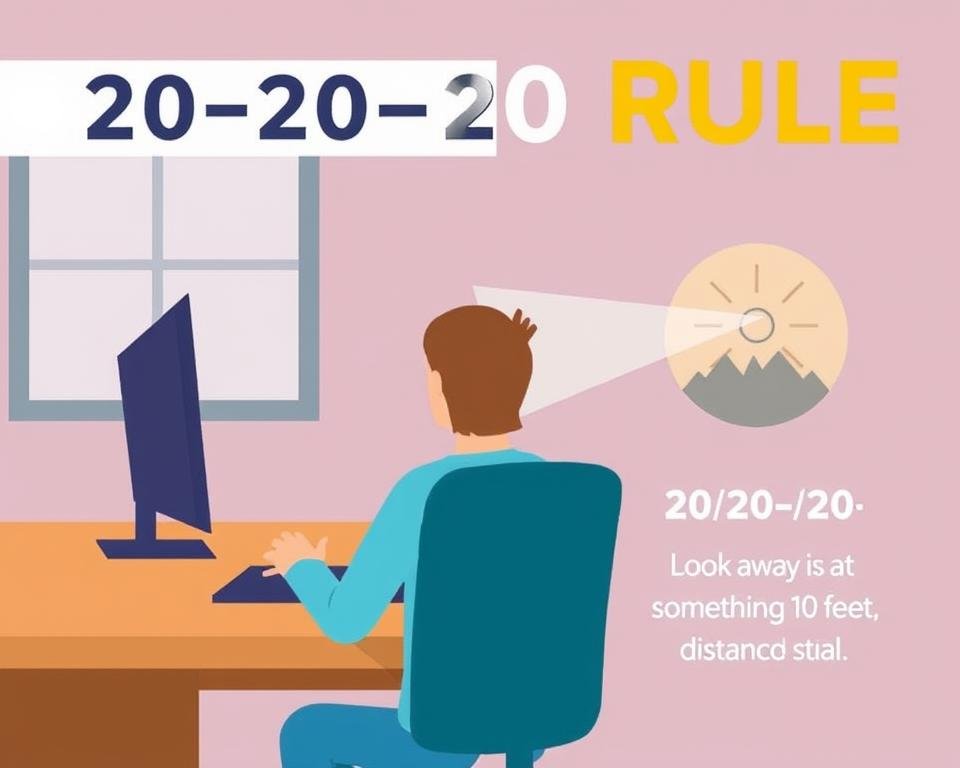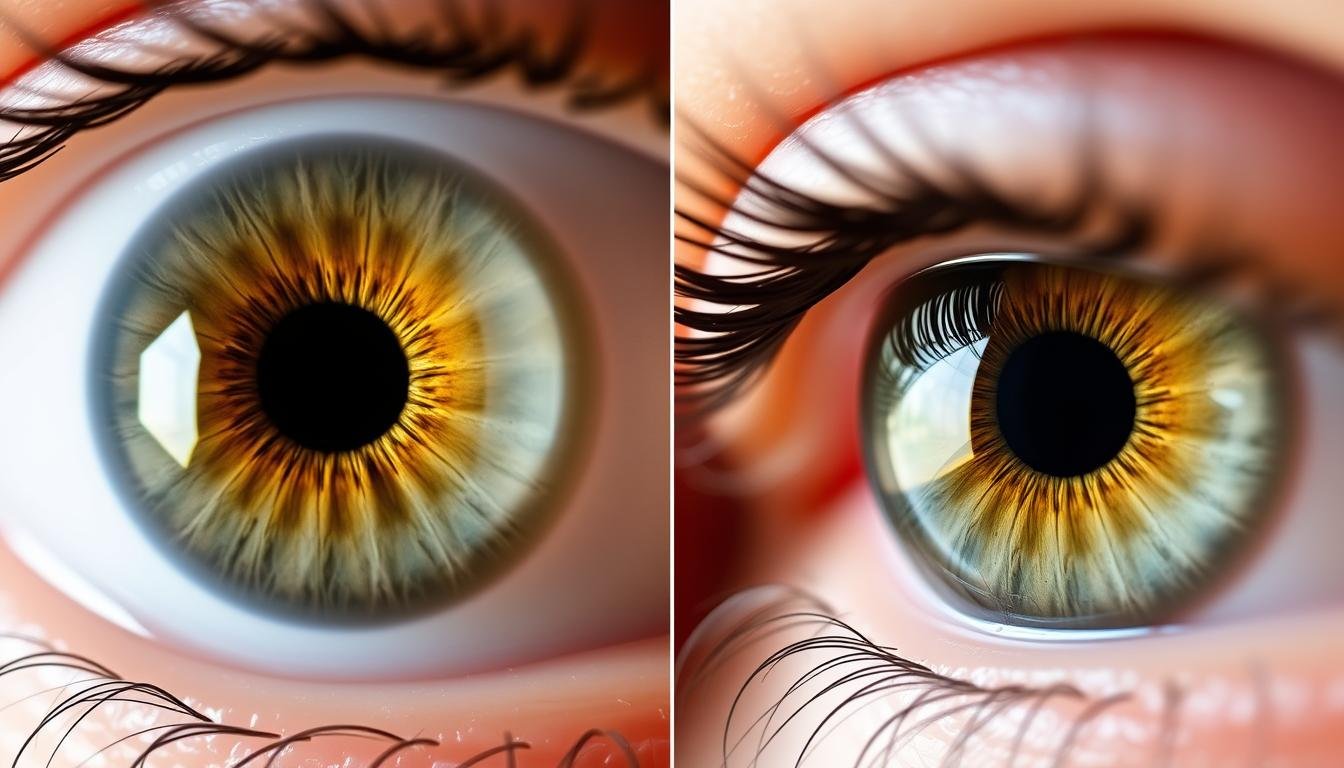Stresové krúžky v očiach znamená? Pozreli ste sa niekedy do zrkadla a všimli ste si kruhové vzory v očiach, ktoré tam predtým neboli? Tieto jemné krúžky môžu byť viac ako len zaujímavou vizuálnou črtou - môžu byť spôsoby signalizácie vášho tela signalizácie zvýšených úrovní napätia. Stresové krúžky v očiach, niekedy nazývané nervové krúžky alebo kontrakčné krúžky, môžu poskytnúť cenné informácie o vašej celkovej pohode. Tento komplexný sprievodca skúma, čo tieto očné zmeny znamenajú, ich potenciálne príčiny a efektívne riešenia riešenia krúžkov a základného stresu, ktoré ich môžu spôsobiť.Čo sú stresové krúžky v očiach?
Stresové krúžky v očiach sú kruhové vzorce alebo depresie, ktoré sa objavujú v dúhovke (farebná časť vášho oka). Tieto krúžky, ktoré sa tiež označujú ako neurovaskulárne kŕče alebo nervové krúžky, sa zvyčajne tvoria ako sústredné kruhy okolo žiaka. Môžu sa líšiť od slabých, sotva viditeľných línií po definované krúžky, ktoré obklopujú časť alebo celú dúhovku.
Z fyziologického hľadiska predstavujú stresové krúžky jemné zmeny v stróme dúhovky - vláknitého tkaniva, ktoré dodáva vašej dúhovke jeho farbu a textúru. Tieto depresie môžu naznačovať napätie v nervovom systéme a môžu byť zdedené alebo získané prostredníctvom faktorov životného štýlu. Aj keď to nie je formálne uznávaný zdravotný stav v konvenčnej medicíne, tieto označenia dúhovky sa už dlho študujú v alternatívnych zdravotných postupoch, ako je iridológia.
Stresové krúžky v očiach znamená? Nervové krúžky sú depresiami v dúhovej stróme a označujú sa ako neurovaskulárne kŕče. Môžu byť zdedené alebo získané, ale buď ukazuje, že jednotlivec má určitý stupeň nervového napätia alebo úzkosti.
Je dôležité rozlíšiť stresové krúžky od iných očných podmienok. Na rozdiel od rohovkového arcusu (biely, šedý alebo modrý krúžok okolo rohovky často spojený s problémami s cholesterolom) sa v samotnom dúhovke objavujú stresové krúžky a zvyčajne neovplyvňujú funkciu videnia alebo očí priamo.
Čo spôsobuje stresové krúžky v očiach?
Tvorba stresových krúžkov v očiach je primárne spojená s tým, ako naše telá reagujú na stres. Keď prežívame chronický stres, náš nervový systém zostáva vo zvýšenom stave bdelosti, ktorý sa môže fyzicky prejaviť rôznymi spôsobmi - vrátane zmien v našich očiach.
Fyziologické faktory
- Predĺžené napätie nervového systému spôsobujúce kontrakciu svalových dúhoviek
- Zmeny prietoku krvi do očných tkanív v dôsledku stresových hormónov
- Minerálne nerovnováhy, najmä nedostatok vápnika
- Zmenený intraokulárny tlak z chronického stresu
- Dysregulácia autonómneho nervového systému ovplyvňujúcej dúhové svaly
Životný štýl a environmentálne faktory
- Chronický psychologický stres z práce alebo osobného života
- Deprivácia spánku a zlá kvalita spánku
- Predĺžená doba obrazovky spôsobujúceho digitálne napätie očí
- Zlá výživa bez esenciálnych minerálov a vitamínov
- Nadmerná konzumácia kofeínu zvyšuje nervové napätie
- Nedostatočná hydratácia ovplyvňujúca celkové zdravie očí
Zatiaľ čo samotné stresové krúžky nie sú zvyčajne škodlivé, môžu slúžiť ako vizuálny ukazovateľ, že vaše telo zažíva chronický stres, ktorý môže mať širšie zdravotné dôsledky, ak sa ponechajú neadresované.
Príznaky spojené so stresovými krúžkami
Stresové krúžky v očiach znamená? Samotné stresové krúžky nie sú príznaky, ale skôr fyzické prejavy, ktoré môžu sprevádzať ďalšie príznaky očí a tela súvisiace s stresom. Ak ste si v očiach všimli stresové krúžky, môžete tiež zažiť:
Príznaky súvisiace s očami
- Únava očí a napätie, najmä po používaní obrazovky
- Zvýšená citlivosť na svetlo (fotofóbia)
- Suché alebo podráždené oči
- Rozmazaná vízia, ktorá prichádza a odchádza
- Ťažkosti so zameraním na blízke predmety
- Napätia hlavy pochádzajúce z napätia očí
Všeobecné príznaky stresu
- Pretrvávajúca únava napriek primeranému odpočinku
- Napätie v svaloch krku a ramien
- Prerušené vzory spánku
- Problémy s trávením, ako je žalúdočné rozruch
- Zvýšená srdcová frekvencia alebo palpitácie
- Zmeny nálady vrátane podráždenosti alebo úzkosti
Prítomnosť stresových krúžkov spolu s viacerými príznakmi z týchto zoznamov môže naznačovať, že vaše telo prežíva významný stres. Aj keď samotné krúžky nie sú škodlivé, základný stres spôsobujúci ich môže ovplyvniť vaše celkové zdravie, ak nie je riadne riadené.
Máte viac príznakov?
Ak si všimnete stresové krúžky spolu s niekoľkými ďalšími príznakmi, môže nastať čas konzultovať s profesionálom v oblasti očí, ktorý môže poskytnúť komplexné hodnotenie.
Nájdite špecialistu na starostlivosť o oči
Rozlišovanie medzi stresovými krúžkami a vážnymi očnými podmienkami
Je nevyhnutné rozlišovať medzi neškodnými zmenami očí súvisiacich s stresom a príznakmi závažnejších stavov, ktoré si môžu vyžadovať okamžitú lekársku starostlivosť. Tu je návod, ako povedať rozdiel:
| Funkcia | Stresové prstene | Závažné podmienky (napr. Rohovkový arcus, glaukóm) |
| Miesto | V rámci dúhovky (farebná časť) | Okolo rohovky alebo ovplyvňujúce žiaka |
| Vzhľad | Koncentrické depresie alebo čiary | Biele, sivé alebo modré nepriehľadné krúžky |
| Bolesť | Zvyčajne bezbolestný | Môže zahŕňať bolesť očí alebo tlak |
| Dopad | Zvyčajne neovplyvňuje videnie | Môže spôsobiť zmeny alebo stratu zraku |
| Vekové združenie | Sa môže objaviť v ktoromkoľvek veku | Rohovkový arcus pred 40 môže naznačovať vysoký cholesterol |
| Postup | Môže miznúť so znížením stresu | Často progresívne bez liečby |
Výstražné príznaky, ktoré si vyžadujú okamžitú lekársku starostlivosť: Náhle zmeny zraku, silná bolesť očí, halos okolo svetiel, extrémna sčervenanie alebo výtok z očí nie sú typické pre stresové krúžky a môžu naznačovať vážny stav vyžadujúci okamžitú lekársku starostlivosť.
Stresové krúžky v očiach znamená? Arcus rohovky, ktorý sa javí ako biely, šedý alebo modrý krúžok okolo rohovky (nie v dúhovke), môže naznačovať vysoké hladiny cholesterolu, najmä ak sa objaví u ľudí mladších ako 40 rokov. Na rozdiel od stresových krúžkov môže byť oblúk rohovky spojený so zvýšeným kardiovaskulárnym rizikom a mal by byť vyhodnotený poskytovateľom zdravotnej starostlivosti.
Efektívne riešenia pre stresové krúžky v očiach
Riešenie stresových krúžkov vo vašich očiach zahŕňa prístup s dvoma bránkami: zníženie základného stresu, ktorý ich môže spôsobiť a implementovať konkrétne postupy starostlivosti o oči. Tu sú účinné stratégie, ktoré pomôžu minimalizovať stresové prstene a zlepšiť celkové zdravie očí:
Techniky zvládania stresu
- Meditácia všímavosti: Cvičte denne 10-15 minút, aby ste znížili celkovú úroveň stresu
- Hlboké dýchacie cvičenia: Vyskúšajte techniku 4-7-8 (Inhale pre 4, držte 7, výdych pre 8)
- Pravidelná fyzická aktivita: Zamerajte sa na 30 minút mierneho cvičenia väčšinu dní
- Primeraný spánok: Uprednostňujte 7-9 hodín kvalitného spánku každú noc
- Činnosti znižujúce stres: Začlenite do vašej rutiny jogu, tai chi alebo príroda
Postupy starostlivosti o oči
- Pravidlo 20-20-20: Každých 20 minút sa pozrite na niečo 20 stôp na 20 sekúnd
- Správne umiestnenie obrazovky: Udržujte obrazovky na dĺžke ramena a mierne pod úrovňou očí
- Primerané osvetlenie: Uistite sa, že váš pracovný priestor má správne osvetlenie na zníženie napätia očí
- Očné cvičenia: Cvičte valcovanie očí, zaostrovacie cvičenia a dlaňovanie (zakrývajú oči teplými rukami)
- Správna hydratácia: Vypite veľa vody na udržanie celkového zdravia očí
- Podpora výživy: Konzumovať potraviny bohaté na antioxidanty, omega-3 mastné kyseliny a vitamíny A, C a E.
Odporúčané doplnky na zdravie očí
Zatiaľ čo vyvážená strava by mala byť vaším primárnym zdrojom živín, tieto doplnky môžu podporovať zdravie očí počas období stresu:
- Komplex vitamínu B – Podporuje funkciu nervového systému
- Horčík – Pomáha relaxovať svaly a znižovať napätie
- Omega-3 mastné kyseliny – Znižuje zápal a podporuje vlhkosť očí
- Luteín a zeaxantín – Chráni očné tkanivá pred oxidačným stresom
Pred začatím akéhokoľvek režimu doplnkov sa vždy poraďte s poskytovateľom zdravotnej starostlivosti.
Kedy hľadať odbornú pomoc
Stresové krúžky v očiach znamená? Zatiaľ čo samotné stresové krúžky nie sú zvyčajne lekárskou pohotovosťou, odporúča sa konzultovať s profesionálom v oblasti starostlivosti o oči, ak:
- Stresové krúžky sa objavia náhle alebo sa rýchlo menia
- Zažívate zmeny videnia spolu so stresovými prsteňmi
- Nepohodlné pocity alebo bolesť sprevádza vzhľad krúžkov
- Máte rodinnú anamnézu očných chorôb, ako je glaukóm
- Techniky zvládania stresu po niekoľkých týždňoch nezlepšujú príznaky
Oftalmológ alebo optometrista môže vykonať komplexné vyšetrenie očí s cieľom vylúčiť akékoľvek vážne podmienky a poskytnúť osobné odporúčania pre vaše zdravie očí.
Často kladené otázky týkajúce sa stresových krúžkov v očiach
Môže stresové krúžky v očiach spôsobiť trvalé poškodenie?
Nie, stresové krúžky samy o sebe nespôsobujú trvalé poškodenie vašich očí. Zvyčajne sú to dočasné prejavy stresu, ktoré môžu vyblednúť so znižovaním hladín stresu. Chronický stres však môže prispieť k iným zdravotným problémom, takže riešenie základného stresu je dôležité pre celkovú pohodu.
Ako dlho trvajú stresové krúžky v očiach zvyčajne?
Trvanie stresových krúžkov sa líši v závislosti od jednotlivých faktorov a zvládania stresu. Niektorí ľudia si môžu všimnúť zlepšenie v priebehu týždňov od vykonávania techník znižovania stresu, zatiaľ čo iní môžu trvať dlhšie. Pretrvávajúce stresové krúžky môžu naznačovať trvalý stres, ktorý si vyžaduje komplexnejšie riadenie.
Sú stresové krúžky v očiach častejšie v určitých vekových skupinách?
Stresové krúžky sa môžu objaviť v akomkoľvek veku, ale môžu byť viditeľnejšie počas období vysokého stresu bez ohľadu na vek. Niektorí ľudia môžu mať genetickú predispozíciu k viditeľnejším stresovým krúžkom. Na rozdiel od limbálnych krúžkov (ktoré často miznú s vekom), stresové krúžky priamo súvisia so súčasnými úrovňami stresu ako s vekom.
Môže strava ovplyvniť vzhľad stresových krúžkov?
Áno, výživa môže zohrávať úlohu v oblasti zdravia očí a stresu. Diéty s vysokým obsahom spracovaných potravín, cukru a kofeínu môžu zhoršiť stresové reakcie, čo potenciálne ovplyvňuje stresové krúžky. Vyvážená strava bohatá na antioxidanty, omega-3 mastné kyseliny a esenciálne minerály, ako je horčík, môže podporovať redukciu stresu a zdravie očí.
Existujú nejaké lieky, ktoré môžu znížiť stresové krúžky?
Stresové krúžky v očiach znamená? Neexistujú žiadne lieky špeciálne navrhnuté na liečbu stresových krúžkov v očiach. Najúčinnejším prístupom je riešenie základného stresu prostredníctvom zmien životného štýlu, techník zvládania stresu a správnej starostlivosti o oči. Ak je stres závažný, poskytovateľ zdravotnej starostlivosti by mohol odporučiť liečbu úzkosti alebo stresu, ale tieto by sa zameriavali na samotný stres, nie priamo krúžky.
Záver: Prevzatie kontroly nad zdravím očí a úrovne stresu
Stresové krúžky v očiach slúžia ako viditeľné pripomienky toho, ako sa naše duševné a emocionálne stavy môžu fyzicky prejaviť. Aj keď tieto označenia dúhovky nie sú zvyčajne škodlivé samy osebe, ponúkajú cenné pohľady na stresovú reakciu nášho tela a celkovú pohodu.
Implementáciou techník zvládania stresu a postupov starostlivosti o oči uvedené v tejto príručke môžete riešiť viditeľné príznaky stresu vo vašich očiach a základné faktory, ktoré k nim prispievajú. Pamätajte, že komplexná starostlivosť o seba-vrátane správnej výživy, adekvátneho spánku, pravidelného cvičenia a pozorného zníženia stresu-sú uvedené nielen vaše oči, ale celé vaše telo.
Ak máte obavy z stresových prsteňov alebo iných zmien vo vašich očiach, neváhajte konzultovať s odborníkom v oblasti starostlivosti o oči, ktorý môže poskytnúť personalizované usmernenie a vylúčiť akékoľvek vážne podmienky. Vaše oči sú skutočne oknami vášho zdravia a venovať pozornosť ich jemným signálom vám môže pomôcť udržať optimálnu pohodu.

